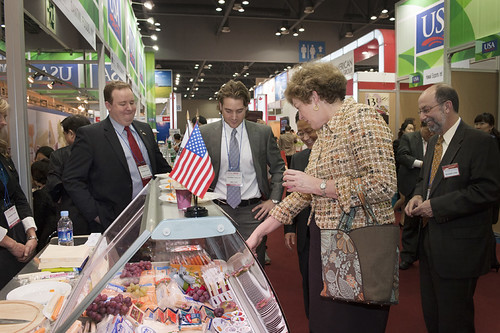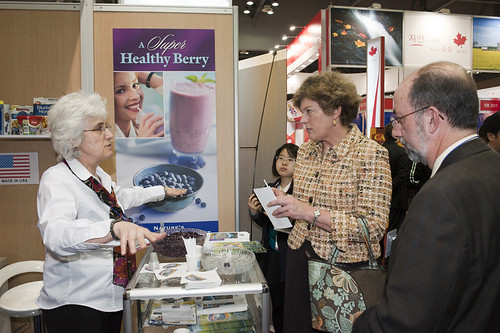Approximately 40 U.S. food companies from every region of the United States set up shop last week at the annual Seoul Food and Hotel 2011 Trade Show, the largest food show in Korea. This year, excitement in the U.S. pavilion was particularly high as the United States recently concluded negotiations with South Korea on the pending U.S.-Korea trade agreement (KORUS), which will provide American agriculture with improved access to Korea’s $1 trillion economy.
The United States is already Korea’s top supplier of a broad variety of food and farm products. U.S. agriculture, fish and forestry exports to Korea totaled $5.8 billion in 2010, making Korea the fifth largest export market for U.S. farm products. Under the KORUS, American products will become significantly more affordable for Korea’s 49 million consumers, since the trade agreement will eliminate most of Korea’s tariffs (taxes on imports).

Lower tariffs will benefit both U.S. suppliers and Korea’s consumers. U.S. foods and beverages would become more affordable for Korea’s consumers, who already appreciate the quality and innovation in U.S. foods and food products. The agreement will also benefit U.S. companies and create jobs by expanding the growing, processing, and transportation of American foods headed for Korea. The tariff reductions under the KORUS will also make U.S. products more competitive with products from the European Union, China and Australia, which have increased their presence in Korea’s $15-billion food and agriculture market.
The implementation of the KORUS will be greatly beneficial to many of the companies in attendance at this year’s show. Idaho Pacific Corporation, a potato processing company based in Ririe, Idaho, looks forward to the opening of a 5,000 ton zero-duty quota for dehydrated potatoes that would be available in the first year of the KORUS.
“Implementation of the trade agreement will enable us to better support the bakery, snack manufacturing, and further-processed foods industries in Korea, at the same time unleashing the creativity of Korean users of potato products,” said the company’s export sales manager. “We also see dynamic growth potential in food service applications. Ratification of the trade agreement could prove to be the most significant event in potato exports in well over a decade.”

Korea is already an important market for U.S. blueberry growers, but U.S. frozen and dried blueberries face current duties of 30 and 45 percent, respectively. The KORUS will phase out these duties over 7 and 10 years, respectively. The U.S. Highbush Blueberry Council reports that KORUS implementation will enable U.S. growers to compete with competitor countries, such as Chile which currently faces no duty on blueberries.
As evidenced by the estimated 50,000 Korean visitors to the show, the demand for U.S. food and agricultural products in Korea is strong and the passage of the KORUS agreement will help U.S. growers and companies build long-term markets for their products in Korea.
To read more about the benefits of the KORUS for U.S. agriculture, visit our website.



